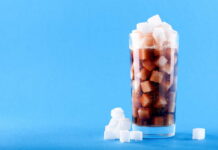
According to a study on Stroke, postmenopausal women who drink multiple diet drinks each day have a higher chance of getting a stroke or a cardiovascular condition. This article examines the science behind this study and the possibility of a connection.
What Were the Study’s Findings?
Researchers discovered that compared to women who had two or more diet drinks per day were at higher risk for vascular issues than women who had diet drinks less than once a week or not at all.
They were 23% more likely to experience a stroke, 31% more likely to have developed a clot-caused stroke, and 16% more likely to die overall.
The authors of the study caution that the findings don’t prove that diet drinks cause stroke. Instead, it discovered that there was a connection between drinking diet soft drinks and cardiovascular events.
Results Questioned
Dr. Micheal Miller, professor of cardiovascular medicine at the University of Maryland School of Medicine, questioned how the study was done. He said a better way to get definitive results was to have a group of women matched for risk factors like cholesterol and weight.
Next, they should be randomized to groups eating different amounts of diet drinks daily and record the response.
Sylvia Wassertheil Smoller, Ph.D., a study co-author, said the team would like to conduct more research involving sweeteners and genetic factors that could make certain individuals react negatively to artificial sweeteners.
Evidence Lacking on Sweetener Safety
The data did not include information on which sweeteners the women consumed. This makes it unclear which could be more harmful or contribute to higher stroke risk.
According to a science advisory from the American Heart Association, there was insufficient evidence to determine if low-calorie sweetened drinks can or cannot alter the risk factors for heart disease or stroke.
What to Drink Instead
Dr. Elizabeth Klodas, a Minneapolis-based cardiologist, said it is best to stick to water. She also said you should avoid all low-calorie and artificial sweeteners. In a published study, Klodas said artificial sweeteners were discovered to change the function of the gut microbiome in mice, which then affected blood sugar metabolism.
Dr. Laura Stein, assistant professor of neurology at the Icahn School of Medicine at Mount
Sinai, said you should also work to prevent and treat common stroke factors such as smoking, high blood pressure, and high cholesterol.
Conclusion
More research is needed to truly assess the connection between taking diet drinks and developing stroke. However, you can protect your health by reducing your intake of artificial sweeteners.



















